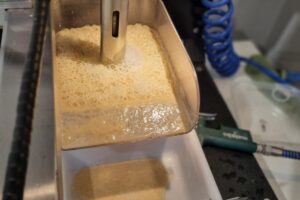
Blockchain technology to boost circular economy in the textile sector
July 7, 2022
CaRo: Core capabilities for co-workers Robots
July 28, 2022The Construction Engineering (EC) Research Group of the Universitat Politècnica de Catalunya (UPC) is participating in the NEUROCRETE project. The aim of this project is to explore the possibilities of introducing the principles of neuromorphic design to develop a new paradigm of smart cementitious materials for civil engineering applications.
A concept that still needs to be implemented at real scale
In the civil infrastructure field, there is a long way to go before we can say that infrastructure is truly smart. One of the most commonly accepted ways of developing smart cementitious materials is the incorporation of conductive phases. Although tests that have been carried out in this area have had very satisfactory results, these materials still have to be incorporated in real structures, that is, at real scale. The concept of designing smart structures has evolved very little in the past 20 years. This is due partly to the high costs and the problems of durability that may arise in sensors installed in the exterior.
NEUROCRETE is designed to advance further in the implementation of intelligence in infrastructure and to introduce a paradigm shift in the design of materials and smart structures to overcome these limitations. The aim is to develop materials and structures that reproduce the functioning of biological systems: networks of materials and structures that imitate neurons and the brain.

Specific objectives of the NEUROCRETE project
First, the project explores the use of cementitious materials that incorporate carbon (for example, carbon fibre) as memristors (an electrical component that combines memory and resistance) to imitate the behaviour of neural systems. This study will help to ensure that the properties of these materials are similar to those of individual components of the human brain.
Second, additive manufacturing (3D printing) will be used to obtain multilayer materials with differentiated properties. This will enable new composites to be created to achieve properties that are not possible with current manufacturing systems.
Finally, the use of new machine learning algorithms will be explored in relation to smart cementitious materials to obtain nociceptive systems that act as a central translation system.
The project started in 2020, lasts 4 years and has funding from the State Research Agency for a value of 157,300 euros.
Sector
Topic
Would you like to know more?
Related Projects
- Researchers from the UPC are participating in the Quartz Enrichment Enabling Near-Zero Silicon (QUEEN) project, aimed at reducing the European Union’s dependence on external sources for critical raw materials, particularly metallurgical-grade silicon (MG-Si). To achieve this, the project proposes harnessing an underused resource: quartz sand from European quarries, to produce MG-Si locally, sustainably, and efficiently.
- A multidisciplinary team of researchers from the Research Group in Smart and Sustainable Resources and Industries (RIIS), the Sustainable Mining Research Group (GREMS), and the Construction Materials and Roads (MATCAR) group at the Universitat Politècnica de Catalunya – BarcelonaTech (UPC) is leading the VALORFIN project. The aim is to develop a technological solution for the valorisation of the fine fraction of construction and demolition waste (CDW), transforming it into new low-CO₂-emission cementitious materials, while also reducing the presence of hazardous materials in this waste.
- 08/07/2025Project Headerrightno-repeat;left top;;auto20px The research groups River Dynamics and Hydrological Engineering (FLUMEN) and Construction Materials and Roads (MATCAR) at the Universitat Politècnica de Catalunya – BarcelonaTech […]
- The Innovation in Materials and Molecular Engineering – Biomaterials for Regenerative Therapies (IMEM-BRT) research group at the Universitat Politècnica de Catalunya – BarcelonaTech (UPC), in collaboration with the Institute of Chemical Research of Catalonia (ICIQ), has developed polymer resins derived from plant-based materials to reduce the dependence of 3D printing on fossil fuel-based resins.




